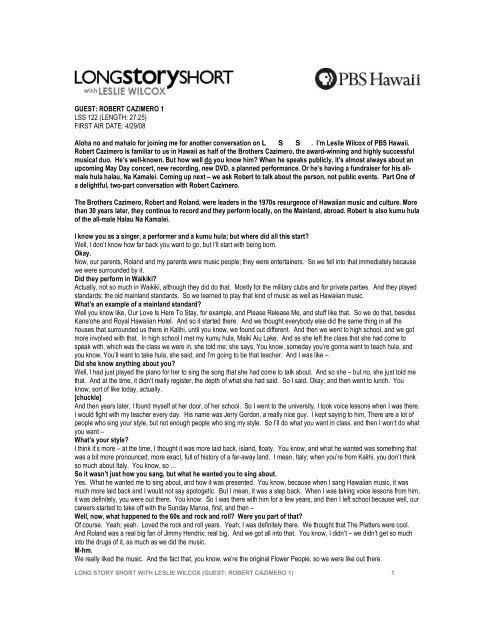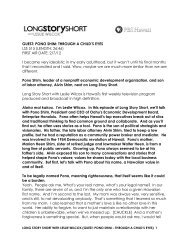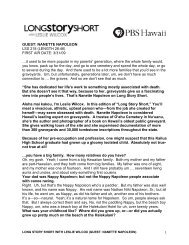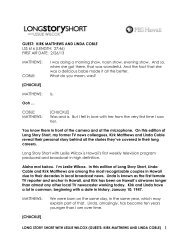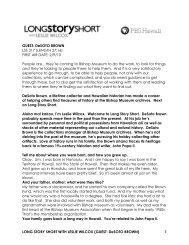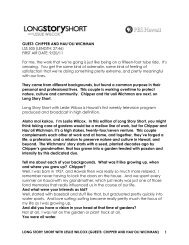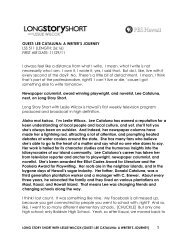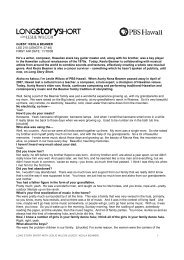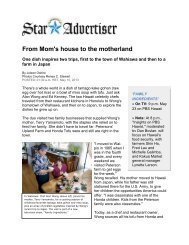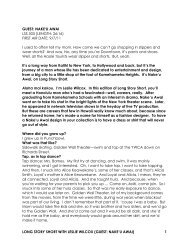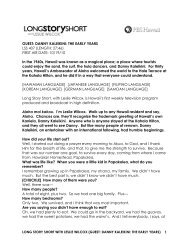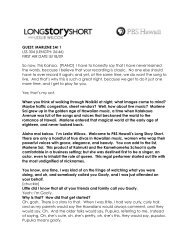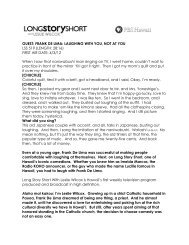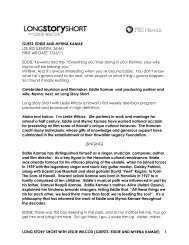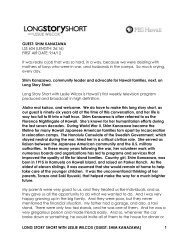transcript - PBS Hawaii
transcript - PBS Hawaii
transcript - PBS Hawaii
You also want an ePaper? Increase the reach of your titles
YUMPU automatically turns print PDFs into web optimized ePapers that Google loves.
GUEST: ROBERT CAZIMERO 1<br />
LSS 122 (LENGTH: 27:25)<br />
FIRST AIR DATE: 4/29/08<br />
Aloha no and mahalo for joining me for another conversation on Ô±²¹ ͬ±®§Í¸±®¬. I’m Leslie Wilcox of <strong>PBS</strong> <strong>Hawaii</strong>.<br />
Robert Cazimero is familiar to us in <strong>Hawaii</strong> as half of the Brothers Cazimero, the award-winning and highly successful<br />
musical duo. He’s well-known. But how well do you know him? When he speaks publicly, it’s almost always about an<br />
upcoming May Day concert, new recording, new DVD, a planned performance. Or he’s having a fundraiser for his allmale<br />
hula halau, Na Kamalei. Coming up next – we ask Robert to talk about the person, not public events. Part One of<br />
a delightful, two-part conversation with Robert Cazimero.<br />
The Brothers Cazimero, Robert and Roland, were leaders in the 1970s resurgence of <strong>Hawaii</strong>an music and culture. More<br />
than 30 years later, they continue to record and they perform locally, on the Mainland, abroad. Robert is also kumu hula<br />
of the all-male Halau Na Kamalei.<br />
I know you as a singer, a performer and a kumu hula; but where did all this start?<br />
Well, I don’t know how far back you want to go, but I’ll start with being born.<br />
Okay.<br />
Now, our parents, Roland and my parents were music people; they were entertainers. So we fell into that immediately because<br />
we were surrounded by it.<br />
Did they perform in Waikiki?<br />
Actually, not so much in Waikiki, although they did do that. Mostly for the military clubs and for private parties. And they played<br />
standards; the old mainland standards. So we learned to play that kind of music as well as <strong>Hawaii</strong>an music.<br />
What’s an example of a mainland standard?<br />
Well you know like, Our Love Is Here To Stay, for example, and Please Release Me, and stuff like that. So we do that, besides<br />
Kane‘ohe and Royal <strong>Hawaii</strong>an Hotel. And so it started there. And we thought everybody else did the same thing in all the<br />
houses that surrounded us there in Kalihi, until you know, we found out different. And then we went to high school, and we got<br />
more involved with that. In high school I met my kumu hula, Maiki Aiu Lake. And as she left the class that she had come to<br />
speak with, which was the class we were in, she told me; she says, You know, someday you’re gonna want to teach hula, and<br />
you know, You’ll want to take hula, she said; and I’m going to be that teacher. And I was like –<br />
Did she know anything about you?<br />
Well, I had just played the piano for her to sing the song that she had come to talk about. And so she – but no, she just told me<br />
that. And at the time, it didn’t really register, the depth of what she had said. So I said, Okay; and then went to lunch. You<br />
know, sort of like today, actually.<br />
[chuckle]<br />
And then years later, I found myself at her door, of her school. So I went to the university, I took voice lessons when I was there.<br />
I would fight with my teacher every day. His name was Jerry Gordon, a really nice guy. I kept saying to him, There are a lot of<br />
people who sing your style, but not enough people who sing my style. So I’ll do what you want in class, and then I won’t do what<br />
you want –<br />
What’s your style?<br />
I think it’s more – at the time, I thought it was more laid back, island, floaty. You know, and what he wanted was something that<br />
was a bit more pronounced, more exact, full of history of a far-away land. I mean, Italy; when you’re from Kalihi, you don’t think<br />
so much about Italy. You know, so …<br />
So it wasn’t just how you sang, but what he wanted you to sing about.<br />
Yes. What he wanted me to sing about, and how it was presented. You know, because when I sang <strong>Hawaii</strong>an music, it was<br />
much more laid back and I would not say apologetic. But I mean, it was a step back. When I was taking voice lessons from him,<br />
it was definitely, you were out there. You know. So I was there with him for a few years, and then I left school because well, our<br />
careers started to take off with the Sunday Manoa, first, and then –<br />
Well, now, what happened to the 60s and rock and roll? Were you part of that?<br />
Of course. Yeah; yeah. Loved the rock and roll years. Yeah; I was definitely there. We thought that The Platters were cool.<br />
And Roland was a real big fan of Jimmy Hendrix; real big. And we got all into that. You know, I didn’t – we didn’t get so much<br />
into the drugs of it, as much as we did the music.<br />
M-hm.<br />
We really liked the music. And the fact that, you know, we’re the original Flower People, so we were like out there.<br />
ÔÑÒÙ ÍÌÑÎÇ ÍØÑÎÌ É×ÌØ ÔÛÍÔ×Û É×ÔÝÑÈ øÙËÛÍÌæ ÎÑÞÛÎÌ ÝßÆ×ÓÛÎÑ ï÷<br />
ï
[chuckle] People talk freely about how you were instrumental in that <strong>Hawaii</strong>an renaissance; the music and language,<br />
and everything that came with it.<br />
M-hm. You know, people do speak freely about the fact that we were there at the start of the renaissance, and leading the way.<br />
We had no idea. We had no idea we were leading the way for anybody, or to anything. We were just there, having a good time.<br />
We were just so happy to have people standing in line out there at Chuck’s Cellar in Waikiki, not to come for steaks, but to listen<br />
to us play music. You know, so we really had no time to think about this whole idea of the renaissance, until maybe like two or<br />
three years after we had already been in it, and someone brought it up and said, What was it like? And we were like, Oh well.<br />
You know, it was very interesting, and it was fun, and –<br />
Well, when you would go out for gigs, did you and Roland think about, you know, your marketing plan, and who your<br />
audience was and how to tailor your music? Anything like that?<br />
No. We were just as wild on stage as we were, you know, at home. We were doing what we were doing. Roland and I used to<br />
go to work in caftans and get on stage and change, and then on the breaks, we’d wear these caftans, walking around the Royal<br />
<strong>Hawaii</strong>an Hotel.<br />
[chuckle]<br />
You know.<br />
They’d never seen anything like that before.<br />
Well, no. I would wake up in the morning, and cut my bedspread, and throw it on, and go to school at the university. ‘Cause it<br />
was the ‘60s, and you were supposed to wear your bedspread to school, or something like that. So yeah. It was never really<br />
planned out or strategically, or any kind of game plan, or –<br />
But it was just who you were. You were doing what you were.<br />
Yeah. And we were still kinda deciding what we were, and what we were doing. You know. And lots of experimentation in so<br />
many different facets. Lots of experimentation. So –<br />
Did you do all kinds of music, or did you do just <strong>Hawaii</strong>an?<br />
Well, at the time, with the Sunday Manoa, we kinda like felt like we should stay in this niche of <strong>Hawaii</strong>an music, you know. But<br />
the influences of like big things that were happening on the mainland became a part of what was entwined with the <strong>Hawaii</strong>an<br />
music. Yeah. So …<br />
So Chuck’s Cellar was your Sunday Manoa time.<br />
Was – yeah – was the very beginning, when we became known. Yeah. And I was 19 years old at the time.<br />
Did you get all big-headed?<br />
No, because we were change – you know, if you thought – there we go again. Just to make sure you knew you weren’t that<br />
important, we would change in the parking lot. There was no dressing room, you know, and you still got $15 for the whole gig.<br />
You know, so yeah. There was no way you could get big head. As the career got to be better and better, some people would<br />
say, You know, you folks are getting to be so Waikiki, so mainland. You know, you’re forgetting where you’re coming from. Well,<br />
let me just say, there is no way you can ever, ever forget that you’re from Kalihi, I don’t care what you try to do in your life, you<br />
know. And after a while, it gets to the point where it’s a time that is so beautiful, and so worth being a part of, that you never,<br />
ever want to forget. You know, I’m proud that I’m a Kalihi guy.<br />
What part of Kalihi were you raised in?<br />
We would say Waena. So it’d be like Kam IV Road, where you know, we were there before they built that monstrosity, the Kuhio<br />
Park Terrace. So in the old days, from the roof of our house, or the back porch actually, you could see the fireworks at the Ala<br />
Moana Shopping Center. You can’t anymore.<br />
Wow; amazing.<br />
Yeah; yeah.<br />
And you always lived in the same place as you were growing up?<br />
M-hm. And I finally moved out, gee many, many years later. ‘Cause our mom had Alzheimer’s for something like 15 years.<br />
And I had come home one day, and she had washed all my silk clothes in Clorox. And I knew that it was time to go.<br />
M-m.<br />
So I left, and I never looked back. [chuckle] Roland still has the house.<br />
Both of the Brothers Cazimero, Robert and Roland, are masters of their craft and consummate performers. But you’d<br />
never mistake one for the other. Different lifestyles, different approaches; but as artists and businessmen, the same<br />
respect for each other.<br />
I really learned how to talk, to be comfortable in front of a crowd through Loyal Garner – watching her perform. Really too, the<br />
Society of Seven, as far as flow is concerned, in a show. And our friend Gramps, who was very influential, and my kumu, Maiki;<br />
watching them. Of course, now, there are the other influences, like Crosby, Stills and Nash, and Kenny Rankin, who I would<br />
listen to for hours. I’d play his records, and I would listen to his style, and try to mimic it. And if he was gonna hold it for these<br />
many measures, I was gonna hold it for that many measures, and one more. You know.<br />
And you always thought you would go into music professionally?<br />
ÔÑÒÙ ÍÌÑÎÇ ÍØÑÎÌ É×ÌØ ÔÛÍÔ×Û É×ÔÝÑÈ øÙËÛÍÌæ ÎÑÞÛÎÌ ÝßÆ×ÓÛÎÑ ï÷<br />
î
No; because getting back to this brother and sister thing. The brother above me, Rodney, was the one who we considered the<br />
voice in the family. So it was very difficult, after he went into the service, for me to start singing, and then to have to sing in front<br />
of him. So that was something we all had to learn about; how to handle things like that.<br />
Because …<br />
Just the whole respect thing; that he was the older one. And still is. And I still think that of all of us, he has the most beautiful<br />
voice.<br />
And how much does he sing now?<br />
Well, he’s working on a new CD, my brother Rodney is. So I’m very excited for it.<br />
Well, Roland seems like chaos.<br />
[chuckle] He’s uh –<br />
He’s out there.<br />
That’s a good way of putting it. You know, he’s really reeled himself in, within the last maybe ten years. But you’re right; he was<br />
out there to the max, and over the top, being Roland Cazimero. I mean, he was wild and wooly and the women were<br />
everywhere and the liquor and the drugs and the food; and that’s making me sound like I was a prude.<br />
[chuckle] And he would probably be late, and you would be on time? Is that how it worked?<br />
Oh, yeah. Oh, big fights about that; I tell you. And it was really some difficult times there. But he – yeah; he had a tendency<br />
to come to work when he was ready to come to work. Yeah.<br />
How about musically; I sense there wasn’t –<br />
Incredible.<br />
There was not any kind of schism about that?<br />
You know, the thing about Roland was that he would come with stuff, because of his life, where it was. It would be so far off of<br />
what I thought was <strong>Hawaii</strong>an but I liked it. You know. And so he would do stuff, and I was like, Okay, let’s put that in and tape.<br />
Mind you, another thing about that too is, we had been with the Sunday Manoa, and Peter Moon was the leader at the time. And<br />
Peter and Roland got along really well. Because as much as I was grounded in the <strong>Hawaii</strong>an thing, those two boys were out in<br />
the world, and they liked other music and would bring it to the table. After we left Peter, then I had to listen a little bit more to<br />
Roland, because he would be the orchestra. I was just gonna be the voice; he was gonna be the orchestra. And it worked out<br />
quite nicely, actually.<br />
Sure has; and still going strong.<br />
Still going strong. And you know what? I can say now that it’s much more fun than it’s ever been. I’ve learned to relax a lot<br />
‘cause you know, I was the one on pins and needles, thinking that I had to like choke his neck to shut up so that I could do a<br />
show. And now it’s just to the point where like it really – it sounds like such a cliché, but it’s all really good when it’s me and<br />
Roland. ‘Cause we’re just having a really good time, and it’s terrific.<br />
Let’s talk about Roland and you for a while.<br />
Okay.<br />
I mean, you’ve had this long career with him.<br />
Yes; very long. It’s a marriage, you know.<br />
Long, and spectacular. And he’s your brother. I mean, did you folks grow up fighting with each other? Like –<br />
All the time.<br />
Like most siblings do?<br />
Yeah; yeah. We fought all the time. But we got to a point – and I think – you know, we really started playing music<br />
professionally with our parents in the – well, I started in the latter part of the 60s, or middle 60s. Roland was already playing<br />
when he was eight years old. So when we went on our own, and by the time we got to like 1973 or 74, we had pretty much<br />
made up our minds that as much as this was show business, we were gonna concentrate more on the business part of it, than<br />
the show. I mean, the show would come along, so we knew that pretty much no matter what happened – believe me, dear, a<br />
lot has happened that we would stick it out. I mean, it’s not like we haven’t had full-out fights on stage, at the Waikiki Shell on<br />
May Day. I mean, not throwing blows, ‘cause people could see that; but I mean throwing words back and forth, and yeah. So<br />
it’s been a challenge, but it’s been great all the way.<br />
Well, you two seem like such different personalities. I’m actually surprised that you are such an enduring and<br />
endearing duo.<br />
I think because we embrace two different worlds that we bring everybody in from those different worlds and meld them into the<br />
Brothers Cazimero.<br />
Well, how do the dynamics of the two of you work?<br />
Well, okay; here it goes. We come from a family of twelve kids; eight boys and four girls. And it was understood thing as we<br />
were growing up that if our parents were there, the oldest child always was the one who we would listen to. I’m older than<br />
Roland by just one year. So …<br />
Were you the oldest? No, right?<br />
No, no, no; I’m number ten of the twelve, so there are nine above me. And so I would just tell them and they’d have to listen.<br />
But you could only boss two other kids.<br />
Yeah. Because if I said something, and my older brother or older sister said something over me I would say nothing after that –<br />
ÔÑÒÙ ÍÌÑÎÇ ÍØÑÎÌ É×ÌØ ÔÛÍÔ×Û É×ÔÝÑÈ øÙËÛÍÌæ ÎÑÞÛÎÌ ÝßÆ×ÓÛÎÑ ï÷<br />
í
But you could boss Roland.<br />
I could boss Roland, and I could boss my sister, ‘cause she’s the twin to Roland. So although, I wouldn’t call it – Roland would<br />
call it bossing. [chuckle] But I wouldn’t.<br />
You’re there in your nice aloha shirt and long pants, and he’s in green tights and a sweatshirt sometimes, crossing<br />
his legs on the stage.<br />
Yes; yes.<br />
It’s just – it’s so funny, and so beautiful.<br />
He does wear some of those clothes. And I have to take credit for some of it, ‘cause I did buy him a few of those things to get<br />
him into it at first. And as I grew out of them he just more and more into them. And it causes a lot of trouble for me in other<br />
places, I’ll tell you.<br />
But he knows who he is, and you know who he is, and you understand each other.<br />
Yeah. So there’s no problem there. You know. And we’ll make fun of it, too. He’ll make fun of it; and it’s fine. I like him so<br />
much more now, and that’s why we get along so much better.<br />
One year difference.<br />
Yes; only one year. But I always felt like I was tons years different than he was. Difference, as far as age.<br />
Did you always feel like you had to keep the duo together, because he was not disciplined?<br />
You know, I don’t know that I felt that way, ‘cause I knew – we had already decided on the business part, so I knew that late or<br />
not or whatever indecision, we were still going to be together. But it didn’t mean it didn’t give me heartburn or heartbreak or<br />
whatever. Because I was on pins and needles.<br />
How much does he surprise you on stage with his comments?<br />
Oh, I never really know what my brother’s gonna say; I never do. And sometimes I will say something that will trigger, and I<br />
know that it’s triggering something in my mind, and I think to myself, You stupid, stupid –<br />
Don’t make eye contact, right?<br />
Yeah.<br />
Don’t laugh.<br />
I shouldn’t have said that; and sure enough, he picks it up, and he goes, and I tell you, I can’t say anything, because the people<br />
are laughing so much, and it’s really so good, and I’m so pissed off.<br />
[chuckle]<br />
But it’s so funny.<br />
It works.<br />
Yeah. One time, we were on stage at the Shell; it was Roland, myself, and Israel Kamakawiwo‘ole. I was between the two of<br />
them. And they started on this thing together, and I didn’t know what the hell they were talking about. All I know is that the<br />
audience was dying outside, and I just said one thing, Leslie; I said just one thing, and I don’t remember what it was. Well I<br />
was smashed down like a bug, and I was like, Okay, I’m so staying out of this one.<br />
[chuckle]<br />
Because Roland and Israel together they were amazing. They had a lot of fun, and a lot of history. So –<br />
And that’s part of the fun of entertaining; the interactions, and you feed off each other, right?<br />
Yeah.<br />
And you become better than –<br />
Especially when they’re –<br />
– the sum of the parts.<br />
– really good, talented people. You know. When you don’t have to say anything or explain anything. So it’s like you and I<br />
talking right now. You know, I’ll just say, Okay, you take it, and then you say, You take it, then we’ll both talk together, or finish<br />
each other’s sentences. Happens all the time. That’s why I said Roland and I have a relationship that is like, you know, we’ve<br />
been married longer than our parents were I think.<br />
You know how in <strong>Hawaii</strong> we tend to call people “Uncle” or “Auntie” as a sign of respect? Here’s a tip, Don’t do that<br />
to Robert. You’re about to find out why. And Robert also explains the feeling he’s had for some time, the one that<br />
drives him to sing every song like it’s the last time.<br />
You know, in terms of experience and achievement, although I don’t know about in terms of age, you’re a kupuna.<br />
Are you treated as such?<br />
Um some people try.<br />
But you don’t let them? [chuckle]<br />
No; I don’t.<br />
What do you –<br />
Another thing I –<br />
– tell them? [chuckle]<br />
I just – actually, you know what? I I’m very lucky that way. No one sees me as really being a kupuna. But –<br />
ÔÑÒÙ ÍÌÑÎÇ ÍØÑÎÌ É×ÌØ ÔÛÍÔ×Û É×ÔÝÑÈ øÙËÛÍÌæ ÎÑÞÛÎÌ ÝßÆ×ÓÛÎÑ ï÷<br />
ì
And that’s a good thing for you.<br />
And that’s a –<br />
That’s a –<br />
– really good thing.<br />
You know, that is a mark of respect, too.<br />
Yeah; yeah. I just I do have a rule, though, and it’s, Don’t call me Uncle. Which is my email address, don’t call me uncle.<br />
[chuckle]<br />
Unless we’re actually related; and if we are related, you gotta mention some names in the family line that I have to recognize.<br />
Otherwise, just call me Robert. You know. And I’ve gone through the gamut of people calling me Bobby from when I was a<br />
kid; Bobby and Bob, and god, I hate that.<br />
Neva Rego calls you Roberto.<br />
Oh, well; yeah.<br />
You don’t correct her. The voice coach you go to.<br />
Oh, no; she can call me Roberto for the rest of my life. That’s fine. But the Bobby one makes me a little queasy. But then<br />
you know which part of my life they’re from. You know. And –<br />
Do you tell people, Call me Robert? I mean, just –<br />
Yes; I do.<br />
– straight out?<br />
Yeah. Hi, Uncle. No; just call me Robert. And you know, you know for <strong>Hawaii</strong>ans, that’s a hard thing, because part of the<br />
respect is that you call each other Uncle and Auntie. But I just tell them, like, Don’t –<br />
That’s because –<br />
Don’t put any kind –<br />
– you don’t see yourself as Uncle?<br />
It’s because, you know, when you’re in the entertainment business, there is no such thing as age. Once you get out of high<br />
school, we’re all the same age. That’s what I say. So, don’t call me Uncle. And don’t call me Auntie, either.<br />
[chuckle] What’s your middle name?<br />
My middle name is Uluwehionapuaikawekiuokalani.<br />
Which means?<br />
Which means the verdant – the abundance of flowers at the summit of the sky. And my mother was pregnant, and she didn’t<br />
know she was, and my aunt, my Auntie Mary Sing who lives in Kalaupapa – that’s a whole ‘nother story – she called my mom<br />
and said, You know you’re gonna, you’re pregnant. And my mother said, No, I’m not. And she said, You’re pregnant; and my<br />
mother said, No, I’m not. And she said, Just listen to me; you’re pregnant, here’s the name of the child. So she gave my mother<br />
my name.<br />
And she’s calling from the Hansen’s Disease settlement at Kalaupapa.<br />
Yes; she is. So my mother said, Okay. But because of the flowers in the name, o napua, she thought that I was gonna be a girl.<br />
Well, anyway; so but I got the name, anyway. And so yeah; sure enough, she was pregnant. She didn’t know it, but she found<br />
out from my aunt. And I’ve had that name ever since.<br />
Do you think you live up to the name?<br />
Oh, I hope so; I hope so. Because the funny thing is, as I graduated kids from my school to their own schools, they’ve taken<br />
parts of the name.<br />
Oh.<br />
And they have it in their school. My niece is my namesake, and she has the same name. And then one of my dancers asked<br />
if he could name his son after me. And I said, Yeah; except take out the o napua, take the flowers part out. So this boy,<br />
Uluwehiikawekiokalani, is one of the newest members in halau now. He’s dancing in the school. That’s the kinda stuff just blows<br />
my mind. I’m just so glad I’m seeing it all happen. You know. It’s really cool.<br />
Sometimes you look back at your life, and you go, Wow, if only this hadn’t happened, where would I be.<br />
Yes.<br />
Was there any one of those moments for you?<br />
Yeah. Would have been my seventh grade; if I didn’t go to Kamehameha, that would have been very different. I think that –<br />
because if not, I would have gone to Farrington. And for all I know, I could have ended up being a drag queen.<br />
M-m.<br />
Just scary, you know. For me. Another thing is that you know, I constantly worry about my voice, and in December I have a<br />
tendency to catch colds, in December. So I try and be really careful about that. And one year, it got really bad, and I lost my<br />
voice. And we were doing three concerts with the Honolulu Symphony. And I did a concert every night, without a voice. I talked<br />
my way through the whole thing. And thank God that the people were receptive. Because it was one of the best concerts, ever.<br />
So, and then I have to tell you about one other time. Roland and I were performing at the Holiday Inn in San Francisco, near the<br />
business district. And we were doing the show; it was Christmastime, and the whole electricity, within like about eight, ten<br />
blocks, went out. And the management said, You know, we need to cancel the show. And the people said, No, don’t cancel the<br />
show. So they brought out this flashlight, a real big one, like this. And they stood at the back of the room, and they put the<br />
ÔÑÒÙ ÍÌÑÎÇ ÍØÑÎÌ É×ÌØ ÔÛÍÔ×Û É×ÔÝÑÈ øÙËÛÍÌæ ÎÑÞÛÎÌ ÝßÆ×ÓÛÎÑ ï÷<br />
ë
flashlight on, and we played the show. And we did like –what would you call that? Like well, unplugged concert. It was one of<br />
the most beautiful shows in my life; it was just great. So you know, glad we did something that at first we weren’t gonna do.<br />
What do you see as the future of your singing career?<br />
You know, it’s kind of difficult for me to think of a future, as far as I’m concerned. Because I just made – well, I’m telling<br />
everybody I’m 62, but I’m not. It’s just that they say to me, Wow, you look really good for 62.<br />
[chuckle]<br />
So that by the time I get there they can say, Well. But I don’t see me being here that long, on this Earth, for this life. So what I<br />
really want to project is the fact that we just keep playing and doing the best in what we do. And if we can produce an album or<br />
a CD every year until the time of my demise, then I’ll be totally happy.<br />
Okay; now, you’ve just shaken me up. You see yourself as having an untimely or early death?<br />
Well, I thought – from when I was a kid, I always thought that I’d be dead by 21. I think it’s in a past life thing of mine. And the<br />
other thing was that if I stayed away from home longer than two months, that I would never return home. So that’s why my trips<br />
have always been short, and coming back in time. And then the longest one was maybe a little over two months, when Roland<br />
and I went with Maiki to Europe. But I always felt that after 21, all these years are real gifts for me. You know.<br />
Do you think you, you live more fully every day, because have this –<br />
Absolutely.<br />
– thought that you might not have a lot of time?<br />
Absolutely. You know, when Roland and I were – I don’t know that I’ve ever said this on, you know, for television or anything.<br />
But when Roland and I were playing with Peter Moon – this was before 1975; we were working at the Royal <strong>Hawaii</strong>an Hotel and<br />
we would get bomb threats in the room. And we would just be playing, and all of a sudden, all the lights would come on. And<br />
they would – we’d have to have everybody taken out, and we’d go out, and the cops would come in, or the bomb squad or<br />
whatever they were, and they would check the whole room, and then they would say, Okay, it’s okay. Now, this would happen<br />
sometimes three times a week. So but I’ll tell you; if you were in the audience after that bomb scare had been nilled, you found<br />
yourself at one of the most amazing, amazing shows. Because we sang like it was the last time. So ever since then, I try – I do<br />
that now. That whenever I do sing or perform, I do it like it’s my last time. Just in case; just in case.<br />
Wow.<br />
You know, I really enjoy getting to know people on this program – especially people I did already know, like Robert.<br />
He’s got much more to share, including what it takes to get into his respected Halau Na Kamalei, why he expelled his<br />
much-loved brother Roland from the halau, and his favorite music lyrics. Please join me and Robert Cazimero for Part<br />
Two of a two-part Ô±²¹ ͬ±®§Í¸±®¬next week on <strong>PBS</strong> <strong>Hawaii</strong>. I’m Leslie Wilcox. A hui hou kakou.<br />
I gotta ask you one more thing.<br />
Okay.<br />
The local thing with the [clucks tongue].<br />
Yeah.<br />
Can you tell me about that?<br />
[chuckle] We were at the Ala Moana Hotel; in those days, we were upstairs at the Summit, which is now called Aaron’s, I think.<br />
And I was singing a song, and there was a man in the audience who was looking at me weird, and then he would say he was just<br />
looking at me, and so I said I said, What? He says, You’re singing the wrong words. And I was like, Okay. Then he said, If you<br />
want, I’ll teach it to you here by the elevator. So we just sat there, and he taught me the words. The next time I sing it, I’m<br />
downstairs at the – we called it the Cave at the time.<br />
M-m.<br />
The Kama‘aina Room. And there was a woman in the audience, but this time she added that. She’s going, like [clucks tongue].<br />
And I was pissed off. So I said, What? And was like, You’re singing the wrong words. I said, No, I’m not. I learned this from a<br />
guy who lives in Keaukaha. And she said, My mother wrote the song. So I sat with her, and I learned it.<br />
Again. [chuckle]<br />
Again.<br />
ÔÑÒÙ ÍÌÑÎÇ ÍØÑÎÌ É×ÌØ ÔÛÍÔ×Û É×ÔÝÑÈ øÙËÛÍÌæ ÎÑÞÛÎÌ ÝßÆ×ÓÛÎÑ ï÷<br />
ê
GUEST: ROBERT CAZIMERO 2<br />
LSS 122 (LENGTH: 26:46)<br />
FIRST AIR DATE: 5/06/08<br />
Aloha no. I’m Leslie Wilcox. Mahalo for joining me for another Ô±²¹ ͬ±®§Í¸±®¬– another island program produced<br />
and broadcast by locally-owned, non-profit <strong>PBS</strong> <strong>Hawaii</strong>. When singer Robert Cazimero stopped by to talk with me, one<br />
on one, he wasn’t alone. He mentioned that his ancestors, all those who went before, were right behind him. And part<br />
of the reason he is driven to meet high standards is the heavy obligation he feels to make them proud. Coming up next<br />
– Part Two of a two-part conversation with musical artist Robert Cazimero.<br />
Robert Cazimero is more than a successful singer and recording artist. He’s also a most-respected kumu hula –<br />
teacher of <strong>Hawaii</strong>an dance. His all-male hula school is called Halau Na Kamalei. The halau is the subject of a<br />
documentary being shown on <strong>PBS</strong> channels nationwide that explores expectations and stereotypes, following the<br />
halau as it prepares for competition. Produced and directed by Lisette Marie Flanary, Ò¿Õ¿³¿´»·æ Ó»² ±ºØ«´¿shows<br />
us Robert Cazimero’s exacting and sometimes harsh teaching style and it reflects his deep devotion to his kumu, the<br />
late Maiki Aiu Lake.<br />
I had a hard time with that, ‘cause they wanted me to tell stories about my kumu. And you know, outside of the family, we don’t<br />
tell stories, because it’s just so personal. You know. I didn’t want to tell stories. And then I said to Lisette, If this will help to<br />
show my respect for my teacher, then I’ll do it. Not realizing that it was really gonna show a lot more, and that it was okay. And<br />
that what I found out about my students is that they love me like how I love my teacher. [Whispers] Sorry.<br />
How easy was it for you to control people’s lives? I mean, you know, kumu hula –<br />
That’s a really –<br />
– by definition is a –<br />
– good question.<br />
– control freak, right?<br />
Yeah.<br />
You know, it –<br />
Yeah.<br />
I’m not saying it very graciously, but –<br />
No, no, no; it’s true, though. Yeah. And you have – there is such a power in being a kumu hula, you know, that is willingly given<br />
to you when the students come in. Because it’s what I did with mine. You know. If she told me to jump off a building, I would<br />
have asked, Which one, and how much higher do you want me to go? ‘Cause you just love them, you know. But I didn’t really<br />
know how to become a kumu. It’s like being a parent. You really don’t know how to be a mother or father until you have kids,<br />
and they teach you how to be that way. It was the same thing with being a teacher. When I started, my kids were like 15, 16<br />
years old, and I was like 23, 24. And the only way I knew how to do it was to scare the well, to scare the –<br />
And you used those –<br />
– out of them.<br />
– words too, right?<br />
Yeah.<br />
You would swear?<br />
Yeah.<br />
You’d call them names?<br />
Yeah; I did. And they would say to me, You know, I don’t even let my parents talk to me this way. I was like, I’m not your parent;<br />
I’m your kumu. So you just better get over it, or there’s the door. And luckily, they stayed. Or luckily, they didn’t beat me up.<br />
And by definition, you have to keep order and discipline. How did you decide how hard core you were gonna be as a<br />
disciplinarian, as somebody who punishes, or has control over –<br />
I just played by –<br />
– second chances, third chances?<br />
Yeah. I played that by ear. I set really – you know, some really heavy duty rules on them. And if they broke it, then you know,<br />
there was no second chance.<br />
What’s an example of a heavy duty rule?<br />
Well, you know, I did not like drugs. I was never a drug person. I, well, sans liquor. Sometimes.<br />
M-m.<br />
ÔÑÒÙ ÍÌÑÎÇ ÍØÑÎÌ É×ÌØ ÔÛÍÔ×Û É×ÔÝÑÈ øÙËÛÍÌæ ROBERT CAZIMERO 2÷<br />
ï
But yeah. So it’s like, you know, if I knew that you were coming to a performance, and if you were stoned then you’re out, from<br />
the performance and the halau, too. You had to be a certain look, you know. No one could – I still say it, although I’m much<br />
more lenient now. No student could dance if they were bigger than me. And back then I was almost 300 pounds when I first<br />
started. You know. So they all had to make sure that I the clothes, they looked good. Otherwise – ‘cause you know, people<br />
don’t really want to see guys dance in clothes; you gotta wear those malo things, and the lawalawas. And I never could wear<br />
them, because well, ‘cause you know. But they had to. You know, ‘cause it was the look, and I wanted to make sure that people<br />
knew who we were.<br />
Well, at that time, you had the only male halau.<br />
Yeah.<br />
Is it still the only male halau?<br />
You know, I think it is. Because most people have both women and men dancing for them. But it was really Maiki’s dream that I<br />
teach only men. And I’ll tell you; like I said, I would have done anything she asked. So I had no problem saying, Okay; I’ll do it.<br />
The thing that you need to know about, if you’re gonna – Leslie, you’re ever gonna teach men? You want to –<br />
Yes.<br />
– be a kumu hula. You’ll be not making any money. And –<br />
As opposed to teaching women; you would make money?<br />
Women, you can make money. People buy houses by teaching women. Teaching men, you will not make money.<br />
Because?<br />
They’re not gonna pay you to teach them how to dance hula. They’re – and there go – it goes back my kumu again, who said, If<br />
a man dances for you, then it is a privilege that you should have them. So I you know, when I was in halau, I was constantly on<br />
scholarship. And so that’s the way I’ve run my halau ever since; that it’s all scholarship.<br />
You teach for free?<br />
Yeah; yeah. And then when we need money, then we have a fundraiser. Or, if it needs supplementation, I have my career. And<br />
I swear, my kumu knew that too. ‘Cause I’m like her. She needs six of these things done, her daughter says, You can’t have the<br />
money; she’ll grab her money and do it herself. And I do the same thing. You know, it’s like, Well, no one tells me no when it<br />
comes to the halau. But if I want something, and they’re like, You know, we don’t have that much money we’re getting it. Yeah;<br />
we’re gonna just do it.<br />
As successful as the halau has been, I’ve heard you say in the past that it’s not easy to get men to dance.<br />
Yes; yeah. It gets harder and harder as the years go along. Although, a new revelation has come along for us; and that is that<br />
now, the sons of my students are dancing for me. And you know, I’ve graduated students as teachers. Four of them are<br />
teaching, even as we speak. And that’s a legacy. That –<br />
M-hm.<br />
– really is. But as far as, for me, a real legacy and a continuation, so that I can actually see it myself; having the kids of my<br />
dancers with me. It makes me want to live longer. It really does. And it makes me want to be a better teacher, too.<br />
How does someone get into your halau? Can any guy get into your halau?<br />
Well, no. [chuckle] No, you can’t. You have to be invited.<br />
And all of your dancers are part-<strong>Hawaii</strong>an?<br />
No.<br />
They’re not?<br />
No. No; and I don’t think that’s really important, either. And that comes from my kumu. You know. Because it’s more about the<br />
heart, I think, and the fact that once you become a member of my halau, then you are <strong>Hawaii</strong>an to me, because now you’re not<br />
just a member of the halau, but a member of the family.<br />
Family; m-m.<br />
Yeah. And so all my family, all my brothers and sisters, and my nieces and nephews; they all know these guys. And they all<br />
know my family. So several years ago, we had a, a family reunion in Kohala, and they said, You know, we’re all going. And I<br />
was like, No, you’re not. They was like, Oh, yeah; we are. ‘Cause sister Jean and sister Gerry told us, and cousin Momi, that<br />
we’re family. So they all came. We all went to Kohala together and –<br />
What’s more important; heart or dancing ability?<br />
Oh, right now, today, at this very moment with you and me; heart.<br />
But tomorrow, dancing ability?<br />
Tomorrow, if we have a show to do and it’s time to get on the stage; dancing ability. But for right now, heart. But it doesn’t mean<br />
I’ll get rid of you. You know. Where before, I would get rid of people much faster. Today, I’m much more lenient.<br />
Among your students in your halau, you’ve admitted your brother.<br />
Yes. Roland came to halau for a while; I think it was a little over a year. And I kicked him out of halau because he was given an<br />
assignment and he didn’t finish it.<br />
What was the assignment?<br />
He had to learn two chants. And we laugh about it today, because had he learned, especially one of them, we’d be – we do it all<br />
the time in our lives, you know; all the time now. But I give my brother a lot of credit. You know, we’re born as brothers in this<br />
lifetime, and then he goes and puts himself, again, in my life by being a student. That’s a difficult thing to do.<br />
ÔÑÒÙ ÍÌÑÎÇ ÍØÑÎÌ É×ÌØ ÔÛÍÔ×Û É×ÔÝÑÈ øÙËÛÍÌæ ÎÑÞÛÎÌ ÝßÆ×ÓÛÎÑ î÷<br />
î
Well, you could give him a second chance.<br />
Well, the second chance is that he’s no longer a student, but he is a kokua. So my brother is there all the time. And I think in<br />
being the kokua now, it’s better than being a student. ‘Cause you still get the lessons, but you don’t get too much of the same<br />
pressure that happened. And what’s happened is, I’ve learned from that lesson too, and because of him, I’ve learned to be able<br />
to give chances to others. Where before, I would have [SNAPS FINGERS] got rid of ‘em, like how I did him. You know.<br />
And –<br />
And the other thing is, you can’t talk back to me.<br />
[chuckle]<br />
You can’t talk back to me.<br />
He would have to stop talking back to you.<br />
You can’t talk back – no. And Roland would like – you know, you can’t talk to me. Not in front of my students; you can’t talk<br />
back to me. That’s just the way it is.<br />
But he can as a kokua?<br />
Yeah. Yeah.<br />
So he worked it out.<br />
Yeah; he did. And I’m really glad he’s the kokua. And yeah. I love him; he’s a good guy. I’ve never said that before on camera,<br />
either. That took a bit.<br />
[chuckle] He’s gonna want copies.<br />
I think so too. He’ll be sending out to the family.<br />
In birth order, Robert and Roland are number 10 and number 11 in a family of 12 children from Kalihi. The two men are<br />
family for life and highly successful musical partners for more than 30 years now. Appreciating family and health<br />
became more important than ever to Robert in 1990. That’s when he found out he has diabetes.<br />
You were 300 pounds at one point?<br />
Oh, yeah. Yeah. It was a long time ago, but still, it was a part of my life. I look at those pictures, and I go, Who is this<br />
monstrous person?<br />
Had you always been heavy as a kid?<br />
Yeah; yeah, I always was. And then in 1990, my doctor said to me; he says, You know, you gotta watch out, ‘cause you’re a<br />
diabetic now. And I was like, Oh; okay. So he said, You have to really think about this, and you know, you have to cut down,<br />
and you have to do this, and you have to exercise, and stuff. And I was like, Oh, jeez; what a bummer. And I started walking in<br />
1990, and it’s been my companion for that long now, and it’s kept me down so that I’m now – I fluctuate between 197 to 204<br />
pounds. And it helps with everything; you know, the heart, the blood, the breathing; stuff like that.<br />
That’s right; breathing. I mean, you have to have good breath control, or you’ll lose your occupation.<br />
And that’s why, you know, I never liked cigarettes. My father was real adamant about us smoking. You know. So I never liked<br />
that, ‘cause I thought, Okay; I’m gonna tell you another story.<br />
Shoot.<br />
When Peter, Roland and I were recording our second album called Guava Jam, no; sorry, Guava Jam was first, Crack Seed was<br />
second. I had just finished singing a song called The Queen’s Jubilee, from a family songbook of the Iaukea’s. And I was sitting<br />
in the studio, and Peter and Roland and the engineer were in that small room that they are over there, and Peter said, Okay,<br />
we’re gonna play this back to you. I was like, All right. So there were two big speakers here, and they started playing the song,<br />
and I’m singing along with it. Well, there was a mirror on the floor on the side over here, and I just happened to glance over it.<br />
And I was looking at myself in the mirror, and I thought, I found it very difficult to believe that the person I was looking at in the<br />
mirror was the owner of this voice that was coming through. Because I didn’t feel that person matched the beauty of the voice.<br />
M-m.<br />
And that, for me, was – what’s that word; epiphany.<br />
M-hm.<br />
It was an epiphany for me, and I kind of realized that this voice was something special; and that’s when I decided that I’d better<br />
take care of it. So all these years, you know, losing the weight and keeping it down and exercising and watching what you eat …<br />
And continuing to take voice lessons.<br />
And continuing to take voice lessons with my dear kumu leo, Neva Rego, who I love to pieces. Both Roland and I went to Neva<br />
at a time where our voices were beginning to fade a bit. We weren’t aware of it. Well, maybe we were, and that’s why we went.<br />
But she added so much to what we needed to remember and do. And still does, you know. I don’t go as often as I used to, but<br />
she has spies. And they’ll come, and they’ll see us, and they’ll call her. And then she’ll call me and she’ll go, Roberto …<br />
[chuckle]<br />
Can you come see Auntie Neva?<br />
And it’s all about getting the best of your voice at any time in your life.<br />
Yeah, and to keep it going. You know. My doctor, Kalani Brady, who is also a student of Neva’s – you know, we’re all kinda like<br />
intertwined. So there’s Neva and me, and there’s Kalani, and there’s Roland, and all of us, and stuff like this, and they always<br />
ÔÑÒÙ ÍÌÑÎÇ ÍØÑÎÌ É×ÌØ ÔÛÍÔ×Û É×ÔÝÑÈ øÙËÛÍÌæ ÎÑÞÛÎÌ ÝßÆ×ÓÛÎÑ î÷<br />
í
say to me, you know, This is something special; you have to take care of it; we’re gonna help you the best we can. So it’s an<br />
obligation too, you know.<br />
You mentioned the beauty of your voice, which is so true. How do you look at that? Do you see that as a gift you take<br />
care of, or do you think uh, of something you created, or …<br />
No; I think it was a gift. I really do. And I find that as I get older now, and as much as I love to sing, I think singing makes me<br />
beautiful. I also think that it’s one of the most honest and scariest things that I do in my life. Because when I’m on stage, or I’m<br />
at home, or at a cousin’s party, and if I’m singing, it is the most honest I could possibly be. I am as wide open as a book; and<br />
you can read all the chapters, ‘cause nothing [chuckle] nothing’s been blocked, or censored. It’s just honestly, blatantly there.<br />
Well, funny you should say that. Because I was reviewing what’s been written about you over the years, but, you know,<br />
I didn’t really see a lot about who you are. Just what you do. Is that because you keep it close?<br />
Yeah. You know, it’s not that I do that conscientiously; it’s just, I’ve always felt when we were talking to anybody, being<br />
interviewed, you know, that has a game plan. We’re talking about the CD, we’re talking about this May Day concert, we’re<br />
talking about entering Merrie Monarch and why we’re doing it. And so I did that. You know. Someday, someone will. And<br />
maybe it’ll happen; I’m not real sure.<br />
I mean, well, you could do it now.<br />
Okay; go.<br />
[chuckle] I would just like to know what drives you, what moves you, what …<br />
I think, first of all, my family. And my kupuna, the ancestors, and the fact that I feel that the – my heaviest obligation is to make<br />
them proud. To not make them embarrassed. Because – and I’ve said this before, and I love this image. That even as I’m here<br />
speaking to you, there are thousands of people behind me right now. Some I know, and some I don’t.<br />
From generations back?<br />
From generations before, from countries that I don’t even know about; they’re just here.<br />
And you don’t want them rolling your eyes.<br />
Yeah.<br />
Their eyes. [chuckle]<br />
Yeah; uh-huh. Or this thing; [clucks tongue]. You know how local people do that [clucks tongue] thing. And that would just kill<br />
me. But they’re all here, and I feel an obligation towards them, and you, and our people and this land. And then I think if I’m<br />
gonna do that, then I have to have an obligation to my health. Even as last night, I’m at a restaurant eating stuff that maybe I<br />
shouldn’t have, you know. I didn’t have the dessert, but okay, I had the pasta. And then when it comes to the hula, I have an<br />
obligation to my teacher and to my students. And I just want to be good for them. I want to really be good for them. And if it<br />
means that my personal life – my personal life does not suffer from anything; it suffers from me, if I want it to suffer. Okay. But<br />
my personal is really the family. And it’s a real broad use of the word family, because it encompasses the ones that I’m related<br />
to by blood, and those that I’m related to by heart. And it just keeps getting bigger. Sometimes I feel like I have no control over<br />
this; and at the same time, maybe I’m not supposed to. So I live my life now in a – I love to say this; a perpetual state of<br />
gratitude. I wake up every morning, and I just say thank you to everybody, and everything. You know, we’re from Kohala, on the<br />
Big Island.<br />
North Kohala?<br />
North Kohala. My mom is from Hawi, and my dad’s from Niulii. And my mother used to say, When you go to <strong>Hawaii</strong> Island, she<br />
says, you must say hello to everyone – the people, the rocks, the ocean, the trees; because they’re related to all of us. You<br />
know. It’s how I feel with uh, with everybody that we meet now, you know. That there is a purpose, and nothing is by accident;<br />
that I’m there to learn the lessons that are happening. And that I’m really, really grateful.<br />
It’s been such a long haul for <strong>Hawaii</strong>ans, who still populate our prisons and are represented on the poverty lists and<br />
many haven’t had access to <strong>Hawaii</strong>an homelands. I mean, how do you see the <strong>Hawaii</strong>an condition today?<br />
Oh, I think it’s appalling. At the same time, though, I’m one of the lucky ones, you know, who <strong>Hawaii</strong>ans will look at me and say<br />
– well, sometimes they’ll say, you know, You sold out. I don’t – I’m not so sure how I did that; I was just working. But the other<br />
they say is, you know, I want to be like you. And I’m thinking, Oh, I don’t know whether you want to do that either. You know.<br />
But if I can help in any way I can and I think of Don Ho. ‘Cause he said to me one night when we were at you know, he used to<br />
go to McCully Chop Suey all the time.<br />
M-hm; at 3:00 a.m. [chuckle]<br />
Yeah, yeah; there you are. Okay; order all that food.<br />
Yeah.<br />
And Don said to me; he says, You know, when people ask for money, I give them money, our people. He said, Are you gonna<br />
do the same thing? I said, I don’t know that I can give them money, but I’m gonna give them what I can. You know. And if it’s<br />
the voice, or if it’s just being there then I’ll do it.<br />
Do you what you can with what you have.<br />
Yeah. Yeah. God, I can’t believe I said some of that stuff.<br />
I forgot Don Ho used to go to McCully Chop Suey in the middle of the night. No, but it’s true; you’ve got to decide you<br />
know, how far you’re willing to go, and how much you’re willing to give.<br />
ÔÑÒÙ ÍÌÑÎÇ ÍØÑÎÌ É×ÌØ ÔÛÍÔ×Û É×ÔÝÑÈ øÙËÛÍÌæ ÎÑÞÛÎÌ ÝßÆ×ÓÛÎÑ î÷<br />
ì
Yeah. And you cannot just talk it; if you said something already, you know, people remember. They can go back now –<br />
especially with the internet; they can go back and see what I said 20 years ago. [chuckle]<br />
Yeah. Well, that’s interesting. He was trying to get you to do the same thing he was doing.<br />
Yeah. Yeah. And you know, Don was one of our greatest supporters.<br />
Wow. He didn’t feel a competitive deal?<br />
No. He just liked what we did. And his mother liked us. So you know, it’s a <strong>Hawaii</strong>an thing. You know.<br />
Yeah; yeah.<br />
You’re a local girl; you understand that.<br />
[chuckle]<br />
You know, I used to always say I don’t know that I would go to war for the United States of America. I don’t know that I would kill<br />
someone for the United States of America. But if they’re threatening <strong>Hawaii</strong> I would stand out front. And years ago, we had this<br />
– there was a kue. there was a march of all <strong>Hawaii</strong>ans. It started at the Aloha Tower, and it came up to the Palace. Several –<br />
Ala, myself. Mapuana, maybe Vicky; we were there at the front, and our job – Manu. We were to chant all these people as we<br />
came in, continuously; it was to be hours and hours of our chanting these people in. And just before they were gonna open the<br />
gate, someone had told us that there might be something happening. That would include, you know, guns and stuff like this.<br />
And Roland had told Ala; If anything happens, you grab my brother, and you folks go in here. And you can talk the talk but if you<br />
can’t walk the walk, then what’s the purpose of it? I said, You know, if anything is gonna happen, then it’s meant to happen, and<br />
I’m putting it out there right now. So if anything happens, I ain’t going; I’m staying right here. I think it’s how you – when you<br />
believe in something, whether it’s our world, or peace or just another person, we have to do what is best for ourselves, and hope<br />
that it’s best for everyone too.<br />
You know, you mentioned that lyrics really speak to you in song. What are the most beautiful lyrics that you sing, and<br />
in what language are they?<br />
Well, there’s – if I had to pick an English song it would be two. One would be David Gates from Bread – he wrote a song called<br />
If. And my favorite line in that song is, And when my life and when my love for life is running dry, you come and pour yourself on<br />
me. When I sing that line, it’s like, to me, the heavens open up, and I am just drenched with all this love from the people who<br />
know me. The other one is from Carousel, I think. If I loved you, da-da longing to tell you, but afraid and shy I let my golden<br />
chances pass me by. And I’ve let many a golden chance pass me by. But there’s no regret. You can’t have regrets; I refuse to<br />
have regrets.<br />
What about in <strong>Hawaii</strong>an?<br />
In <strong>Hawaii</strong>an, too many; too many. You know, for me, the most simplest things have the deepest meanings. So oh, gee; god,<br />
what’s the – there are so many. I can’t even think of – okay, there’s a song what was written by Lei Collins, and it’s called – they<br />
call it Kealoha. And it goes, [sings]. In the third verse, it says [sings]. That I become very relaxed and I am comfortable when<br />
the scent of my lover is present. I love that line. Because no one knows that scent, except you, you know. And whether they’re<br />
there with you or not, physically, that scent that you remember can put them right in front of you. And I think that’s powerful;<br />
that’s – you know. And then another one is from Pua Ahihi, written by Kawena, and it says [sings] No, no, no, no. There’s this<br />
one verse, and it talks about there’s a flower, okay, so it’s you know Lanihuli? Lanihuli is that mountain there at the Pali; when<br />
you’re standing at the Pali lookout, it’s the one on the left hand side. And what it says is that you’re – this person that you love is<br />
like a lehua flower up there, but it is pretty much unreachable. And the reason that person is unreachable is because you put<br />
that person there. That that’s how much your love is extended to the fact that you would take this person that you love, and put<br />
them so high out of reach that it’s worth the love. That’s what it means to me.<br />
Beautiful lyrics, lovely sentiments. Speaking of sentiments, I’d like to thank our viewers who’ve sent kind thoughts and<br />
encouraging words as <strong>PBS</strong> <strong>Hawaii</strong> works to deliver quality, local programming that inspires, informs and entertains.<br />
Mahalo to you and to Robert Cazimero for sharing your time and joining me for this Ô±²¹ ͬ±®§Í¸±®¬. I’m Leslie<br />
Wilcox. A hui hou kakou.<br />
You know, we’ve lost some just treasures of <strong>Hawaii</strong>an music, and just recently too.<br />
Yeah.<br />
And of course, you know that you’ve earned a place in that vaulted place; I mean, you’re already there, where you’re a<br />
treasure. Do you ever think about how people will receive news sometime long from now, I hope, when you pass away?<br />
I think that’s why I work so hard when we do an album to make sure that it’s the best that it can be. Because really, it’s that music<br />
that’s immortal. It’s not this; it’s that music. So I try hard, and I wonder how they’ll receive it. You know, I wonder.<br />
ÔÑÒÙ ÍÌÑÎÇ ÍØÑÎÌ É×ÌØ ÔÛÍÔ×Û É×ÔÝÑÈ øÙËÛÍÌæ ÎÑÞÛÎÌ ÝßÆ×ÓÛÎÑ î÷<br />
ë


